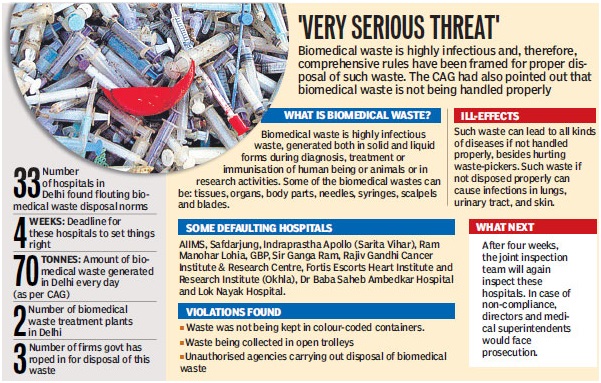| You are at Toxics Alert > News > 33 city hospitals face flak over biomedical waste | |||
 |
 |
||
|
Subscribe || Tell a Friend || Print View | ||
| Home | Editorial | Feature | Interview | News | Policy | Updates | Reports / International News | Partner | |||
|
|
Previous Article | Next Article 33 city hospitals face flak over biomedical wasteSource: Hindustan Times, Date: , 2013Most private and government hospitals in Delhi are posing a "very serious threat" to human health and environment because they have failed to ensure proper disposal of highly infectious biomedical waste, the National Green Tribunal said on Wednesday. A joint team of the Central Pollution Control Board (CPCB) and the Delhi Pollution Control Committee (DPCC), constituted by the tribunal, inspected 28 hospitals in the Capital and found that biomedical waste was being disposed in the most unscientific manner. The tribunal has issued notices, asking all these hospitals to set things right in four weeks or face action. The team will again inspect these hospitals and file a status report by July 19, when the matter is heard next. Hearing a petition, the tribunal had on April 23 issued notices to five hospitals for the same violations but formed a joint team for a comprehensive inspection of other private and government hospitals. Biomedical waste is highly infectious, generated both in solid and liquid forms during diagnosis, treatment or immunisation of human beings or animals or in research activities. Some biomedical wastes are tissues, organs, body parts, needles, syringes, scalpels and blades. These can lead to all kinds of diseases if not handled properly. Referring to the inspection team report, the tribunal said biomedical waste is collected in open trolleys at hospitals such as Hindu Rao Hospital. "There is no proper colour scheme to be followed for segregation…there is no system to dispose of such waste as per rules," the tribunal said. "Safardjung Hospital, Kalawati Saran and Lala Ram Swaroop Institute of Tuberculosis and Allied Diseases are among such other hospitals," the tribunal said. "If the directions issued by the inspection team are not complied with in the time specified, the directors and medical superintendents of these hospitals would face prosecution," the tribunal ruled. The tribunal also ordered the CPCB and the DPCC to inspect all these 33 hospitals once the deadline for compliance ends and submit a status report. Some of the provisions of the Bio-Medical Waste (Management and Handling) Rules, 1998, say colour-coded containers have to be used for different types of wastes. Only authorised agencies can collect and dispose such wastes at their faculties through various methods such as incineration, shredding and deep burial. But that's not being followed strictly. Comptroller and Auditor General has put the daily biomedical waste generation in Delhi at 70 tonnes and said treatment is being done with scant regards for safety concerns.  |
•
Home •
FEATURE •
INTERVIEW •
NEWS •
POLICY •
UPDATES •
REPORTS / INTERNATIONAL NEWS •